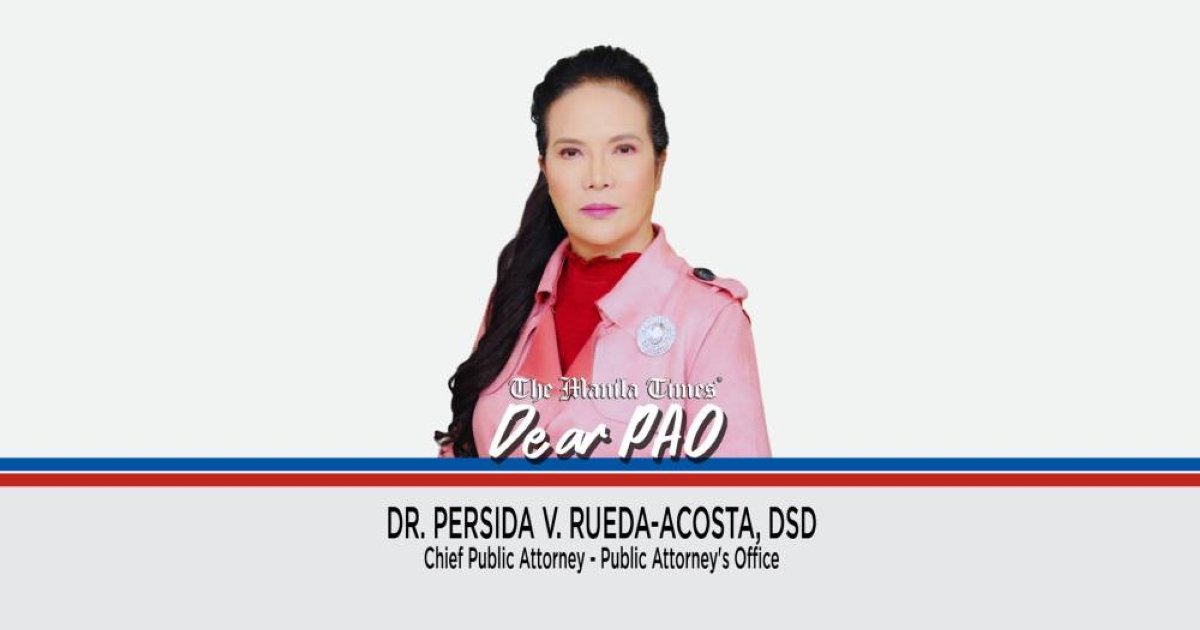Dear PAO,
My former live-in partner is complaining that I am depriving my non-marital child of support because I failed to grant her demand for an increase in financial support. I explained to her that I cannot grant the increase because my salary is just enough for me to survive. She allegedly had information that I am receiving substantial transportation and housing allowances from my employer, and adding these allowances to my salary would make me capable of granting the increase. She claimed further that mere deprivation of support is already a punishable act. Am I liable for abuse by mere allegation of deprivation of support? Are my allowances included in the determination of support?
Roland
Dear Roland,

There are two punishable acts under Republic Act 9262, or the “Anti-Violence Against Women and Their Children Act of 2004,” which involve deprivation of support. These are found under Section 5 (e ) (2) and Section 5 (i). The distinction between these acts was explained in the case of Acharon vs. People of the Philippines (GR 224946, Nov. 9, 2021), where Associate Justice Alfredo Benjamin Caguioa stated that:
“xxx. Section 5(e) punishes the deprivation of financial support for the purpose of controlling the woman or to make her and/or her child or children lose their agency. Section 5(i), on the other hand, punishes the willful infliction of mental or emotional anguish, or public ridicule or humiliation upon the woman and/or her child or children by denying her and/or her child or children financial support that is legally due her and/or her child or children. Thus, while the portions of Sections 5(e) and 5(i) that deal with denial or deprivation of financial support may seem similar at first glance, they, in reality, deal with different matters and penalize distinct acts. xxx”
It is important to emphasize that mere deprivation of support is not a punishable act under Republic Act 9262. This was reiterated by Associate Justice Alfredo Benjamin Caguioa in Calingasan vs. People of the Philippines (GR 239313, Feb. 15, 2022), where it was held that:
“Further, the Court reiterated that mere failure or inability to provide financial support is insufficient to warrant a finding of guilt for violation of either provision. There must be both an allegation and proof of the existence of the requisite specific intent penalized under each of these provisions: for Section 5(i), that the denial of financial support was for the purpose of inflicting psychological violence upon the woman and her child; while for Section 5(e), that the deprivation of financial support was for the purpose of controlling or restricting the woman’s or her child’s actions or decisions.”
Nonetheless, allowances may likewise be a source of support, as they are a form of income from which support may be taken. This is in consonance with the pronouncement of the Supreme Court in Cumigad vs. AAA (GR 219715, Dec. 6, 2021), where the Supreme Court, through Associate Justice Marvic M.V. F. Leonen, stated that:
“Salary increases are not akin to allowances or benefits, and cannot be confused with either. The term ‘allowances’ is sometimes used synonymously with ’emoluments,’ as indirect or contingent remuneration, which may or may not be earned, but which is sometimes in the nature of compensation, and sometimes in the nature of reimbursement. Allowances and benefits are granted to the employee apart or separate from, and in addition to the wage or salary.
“On the other hand, income covers not just salary, but also other sources such as emoluments and honoraria, bonuses, allowances, pensions, retirement pay, and the like. Salary is but a component of income. And because Republic Act No. 9262 provides that the support can be obtained from income or salary, we affirm the amount of financial support indicated in the protection order, which includes the petitioner’s allowances.”
Applying the afore-quoted decision in your situation, financial support for your non-marital child may be deducted from your income. Remember that “income” covers not just salary but also other sources such as emoluments and honoraria, bonuses, allowances, pensions, retirement pay, and the like. Hence, your belief that allowances do not form part of the salary for purposes of determining appropriate support is immaterial since income covers allowances. If there is abuse in withholding support as detailed above, then you may likewise be criminally liable under Republic Act 9262.
We hope that we were able to answer your queries. This advice is based solely on the facts you have narrated and our appreciation of the same. Our opinion may vary when other facts are changed or elaborated on.
Editor’s note: Dear PAO is a daily column of the Public Attorney’s Office. Questions for Chief Acosta may be sent to [email protected]










